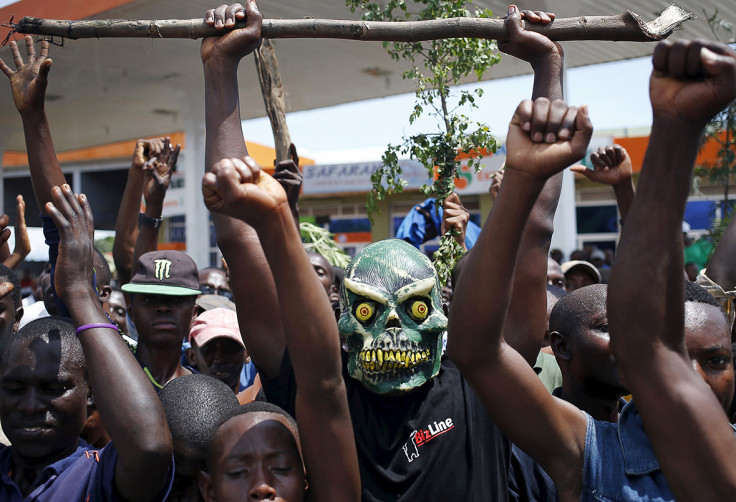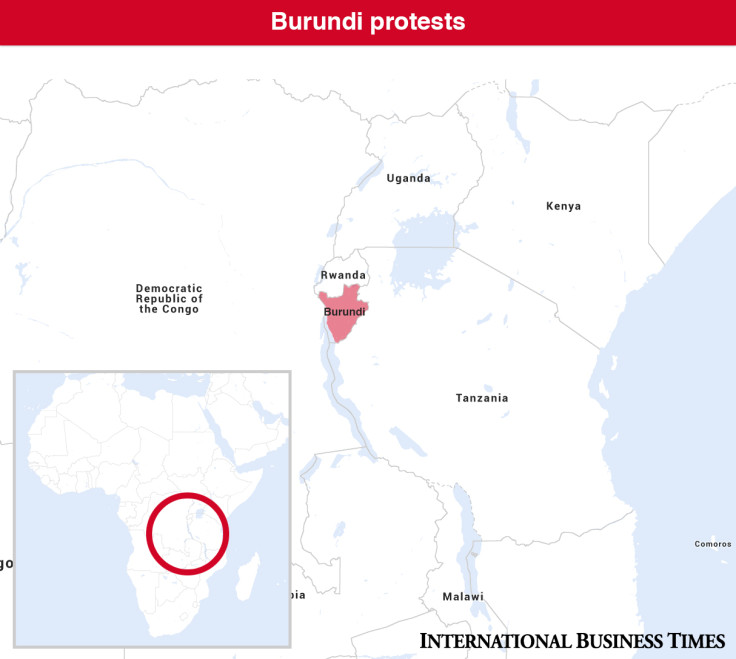Burundi coup: What do neighbouring countries think of Nkurunziza's third term bid?

The East African Community (EAC) – formed of Kenya, Rwanda, Tanzania, Uganda and Burundi –has condemned a military coup d'etat in Burundi.
The coup was announced on public radio, with Godefroy Niyombare, a former SNP chief fired in February, saying: "Active forces of the nation have decided to take charge of the country.
"President Pierre Nkurunziza is removed from office."
"The summit condemns the coup in #Burundi, it does not solve problems," #Tanzania pres reportedly said at end of 5-country EAC mtng
— Rawya Rageh (@RawyaRageh) May 13, 2015EAC Chairman @jmkikwete condemns the coup in #Burundi and calls for return to constitutional order https://t.co/rjyQWRh00W
— JFJustice (@JFJustice) May 13, 2015The coup followed weeks of unrest in Burundi, where violence erupted following President Pierre Nkurunziza's announcement that he will seek a third term in the June election.
Protesters accused the leader of violating the constitution and the Arusha Peace Agreement, which states the president can only stay in power for two terms.

According to Uganda-based independent journalist Fulvio Beltrami, who reports on countries that form Africa's Great Lakes region, the Burundian president has been "left alone by the EAC and the African Union (AU)".
He told IBTimes UK that AU "is ready to suspend Burundi should the country not respect democratic rules set in the Arusha accord."
AU chief Nkosazana Dlamini-Zuma urged Burundi to delay the election and warned that there should not be a third term.
IBTimes UK looks at what Burundi's neighbouring countries and other African nations involved in the 2000 Arusha peace process have said regarding Nkurunziza's third term bid and the ongoing unrest that has killed at least 20 people.
Tanzania
President Jakaya Mrisho Kikwete, the current EAC chairman, said in a statement that a third term would not be in the best interests of Burundi. During a meeting of the East African Legislative Assembly (EALA), an arm of the EAC, he said: "I appeal to the citizens of the country to adhere to the Constitution of Burundi, the Electoral Laws and the Arusha Accord."
Uganda
According to some reports, the EAC's decision could become complicated further if Nkurunziza points out that "[Uganda's President Yoweri] Museveni had changed the constitution [in 2005] to stand for a third term in Uganda, and there are noises in Rwanda about doing the same."
Earlier in May, the UN appealed to Museveni to intervene to halt the violence in Burundi. It was not immediately clear whether Museveni accepted.
Rwanda
Earlier in May, Rwanda's Foreign Minister Louise Mushikiwabo said: "While we respect Burundi's sovereignty in addressing internal matters, Rwanda considers the safety of innocent populations as a regional and international responsibility."
According to Beltrami, Rwanda is ready to "invade Burundi" to attack the Hutu rebel group Democratic Forces for the Liberation of Rwanda (FDLR), which the US accused of having carried out dozens of terror attacks in eastern DR Congo.
Rwanda has previously sent troops to DR Congo to tackle the FDLR, which includes members of the Interahamwe, or "those who stand together", a Hutu paramilitary organisation responsible for the 1994 Rwanda genocide in which at least 800,000 people, mainly Tutsi and moderate Hutu, were killed. The organisation left Rwanda and sheltered in DR Congo in the aftermath of the genocide.
Beltrami claimed that in order to instigate a fear of genocide and use it in his favour, Nkurunziza used the Imbonerakure – the youth wing of his party National Council for the Defense of Democracy (CNDD-FDD) – which, he alleged, has been brainwashed with genocide propaganda during training in eastern Congo by the FDLR.
Rwanda has also expressed concern at reports claiming that violence in Burundi was linked to the FDLR. The claim has been denied by the government.
Meanwhile, Reuters reported that US ambassador to the UN Samantha Power was worried about "credible reports" of the distribution of weapons to militias supporting Nkurunziza. She added that the US is ready to take action "including visa bans or sanctions" if the Burundian government does not halt the violence.
The UN refugee agency spokesman Adrian Edwards said those fleeing Burundi, more than 50,000, spoke of "harassment and intimidation by Imbonerakure youth militants, who paint red marks on homes of people to be targeted".
Kenya
President Uhuru Kenyatta urged Burundi's parties to open up dialogue, which he said is the only way to end violence.
"The consequences of the unrest in Burundi will be felt beyond the country's borders especially neighbouring countries," he said during a meeting with the Common Market for Eastern and Southern Africa (Comesa) Committee of Elders.
South Africa
President Jacob Zuma was quoted by news agency ANA as saying to reporters: "We don't think Burundi should be allowed to go to war again. People should come to some conclusion that they must stop the escalation of the violence that is taking place there.
"The events in Burundi are unfortunate indeed because Burundi comes from a very difficult period.
"It took a long time. One would have thought that Burundians would not want to look back to that situation as it were now. So it is a situation that is ongoing. We believe the leadership there should be mature. It should be the country that is put first."
Beltrami said that South Africa, which was involved in drafting the Arusha Peace Accord, has expressed concern over Nkurunziza's "attachment to power and the grave crisis he provoked".
@PierreNkurunziz just arrived in Dar Es Salam for #EACSUMMIT on #Burundi pic.twitter.com/poxxPI4I2N
— Burundi | Présidence (@BdiPresidence) May 13, 2015© Copyright IBTimes 2025. All rights reserved.






















